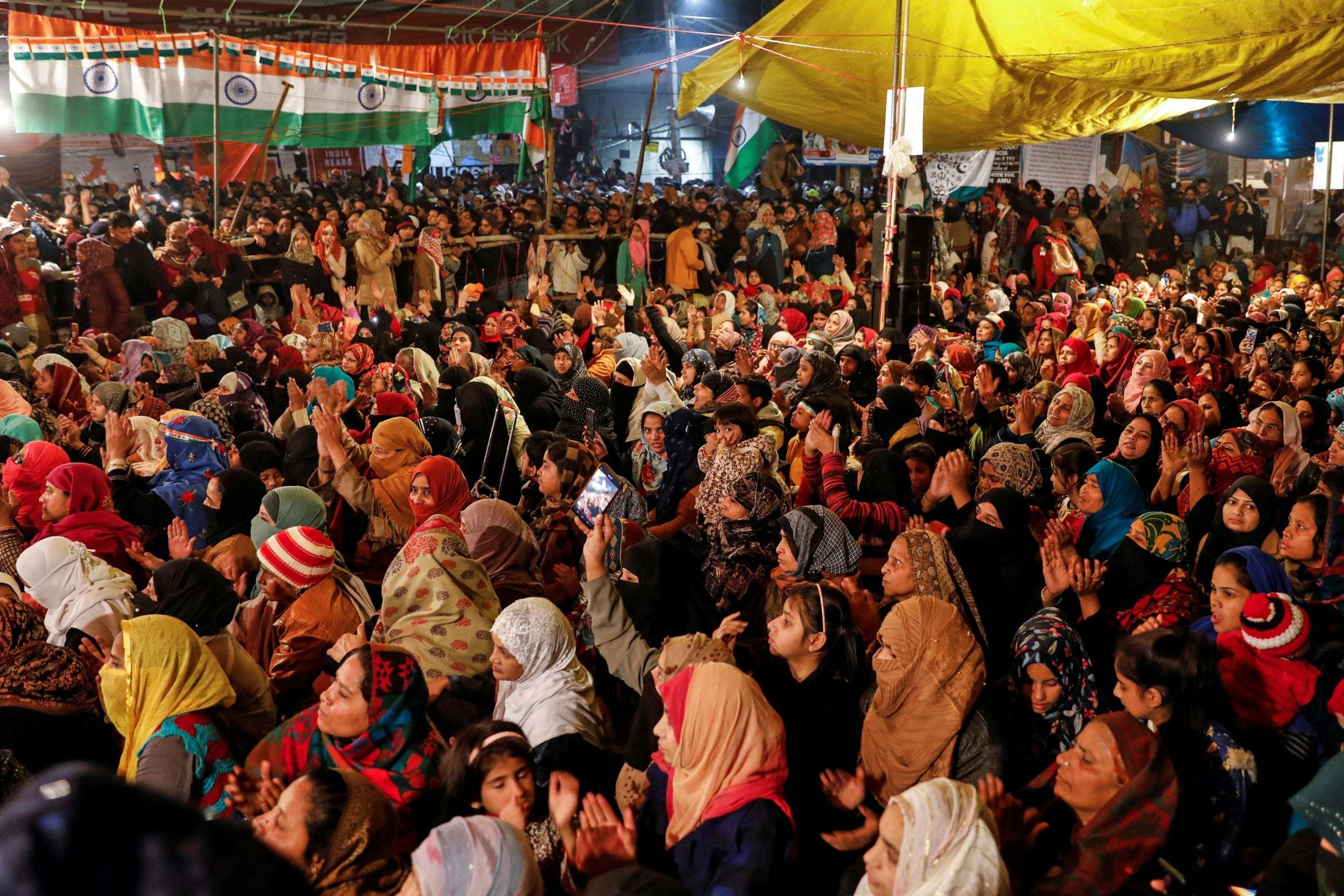Shaheen Bagh protest: Baby dies from exposure to cold as mother takes part in 50-day Delhi sit-in
Protest in South Delhi has become focal point for nationwide movement against new citizenship laws

A four-month-old baby boy has died in India after his mother brought him along to protests against Narendra Modi’s new citizenship law.
The child’s 24-year-old mother, Nazia, had been taking part in the occupation of a major road in Delhi, a sit-in protest that has now entered its 52nd day.
The demonstration in the Shaheen Bagh neighbourhood has persisted despite temperatures dipping into single digits on cold nights in the capital.
The protests have been fuelled by opposition to the Citizenship Amendment Act (CAA), a law granting a new path to Indian citizenship for refugees of all religions except Muslims.
A protest organiser confirmed to The Independent that Nazia’s son, Mohammed Jahaan, had died after accompanying her to the sit-in, where many participants are Muslim women and are observing a hunger strike for 12 to 14 hours a day.
Nazia’s husband, Mohammed Arif, said she had returned home with Jahaan and their two other children – a five-year-old girl and a boy aged one – at around 10pm on 29 January, and Jahaan appeared to have a fever.
The baby awoke crying in the night, and the couple resolved to bring him to see a doctor the next day. They found him unresponsive in the morning, however, and he was declared dead upon arrival at hospital.
Speaking to The Indian Express, Nazia blamed the government’s measures, which have sparked protests across the country, for her child’s death.
“I would bring him to the protest to fight for the future. He was only a witness in the fight,” she said.
She suggested her family may not support her involvement in the protests, but said what happened to Jahaan would only strengthen her resolve to keep demonstrating.
“I am not afraid of anyone now,” she said. “I have already lost a child. I don’t mind if the lives of my other two kids are sacrificed for the same cause.”
The Modi administration says the CAA will help protect minorities fleeing to India from its Muslim-majority neighbours, including Pakistan, Bangladesh and Afghanistan.
But critics of the measure say existing asylum laws already catered well to anyone fleeing persecution, and that the CAA is instead the latest attempt to reform India as a Hindu nation. Muslims make up secular India’s largest minority, around 14 per cent of the population.
The law and a connected crackdown on illegal immigrants, through the introduction of a National Register of Citizens, have sparked hundreds of protest rallies across the country and at-times deadly clashes between protesters and police.
Protests against India's new citizenship law
Show all 15Women have been at the forefront of the anti-CAA backlash in many places, and no more so than at Shaheen Bagh, in spite of the generally conservative perception of gender roles that persists in India today.
Speaking to The Independent at the sit-in last week, 62-year-old Shaheen said she had the strength to stand up to the government’s measures precisely “because I am woman”. Despite being part of the protest from the start, she said she was “fit and strong… [with] the energy to continue the fight for our country”. “Women in India are really powerful, more so than the men perhaps,” she said.
Shaheen called the CAA part of “a cumulative effort to take my rights away from me”, and an affront to “the beautiful [Indian] constitution, which is secular in nature”. “We have no choice but to come forward and fight,” she said.
Jahaan’s death has already led to renewed criticisms of the women protesting at Shaheen Bagh.
Indian media widely reported on a letter, written by the 12-year-old winner of a national bravery award, urging the Supreme Court to prevent children from being brought to protests.
Zen Gunratan Sadavarte’s letter accused the protesters of “ignoring the fact that newborn babies need a lot of attention and care”, calling the decision to bring them to protests a violation of their rights. Her comments were widely shared on social media.
Subscribe to Independent Premium to bookmark this article
Want to bookmark your favourite articles and stories to read or reference later? Start your Independent Premium subscription today.

Join our commenting forum
Join thought-provoking conversations, follow other Independent readers and see their replies